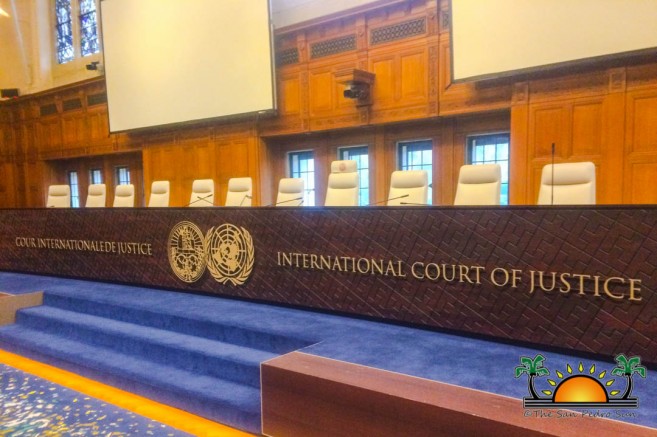On Wednesday, June 7th, Belize delivered its last written response, called ‘Rejoinder’, to the International Court of Justice (ICJ) in the legal proceedings to settle Guatemala’s territorial, insular, and maritime claim over the Jewel. This ended the stage of written submissions, and the next step is for the court to set a date for the oral hearings. The stage of written submissions has lasted four years since the case was formally submitted to the ICJ in 2019. Since then, Belize and Guatemala have presented written presentations known as Memorials, defending their respective position in the long-standing territorial dispute.
The Rejoinder was delivered at the ICJ headquarters in The Hague, Netherlands, by members of the Belize team headed by Ambassadors Assad Shoman and Alexis Rosado. They were joined by Chief Operations Officer Mariana Verde, and Legal Counsel Catherine Drummond. The country’s legal team assure Belizeans that a strong case had been put forward to guarantee Belize’s sovereignty and territorial integrity.
This act to settle this dispute at the ICJ was penned on December 8, 2008, with the signing of a document titled ‘Special Agreement’ between Belize and Guatemala. Belize formally submitted the case to the ICJ in June 2019, following the results of a referendum that same year in which Belizeans voted to have the claim settled at this international court. Guatemala held a similar referendum in April 2018, resulting in its citizens agreeing to take the claim to the ICJ for final settlement.
Guatemala submitted theirs on December 8, 2020. Belize submitted its response (Counter-Memorial) to Guatemala’s claim on June 3, 2022. In December of that same year, Guatemala delivered its reply to Belize’s Counter-Memorial. With Belize’s final reply, known as a Rejoinder, on June 7, 2023, the period of written pleas ended. The next step is oral hearings as presented by the legal teams of both countries.
At the end of this stage, the judges at the ICJ will make a decision and declare whether Guatemala has
any rights over Belize or not. Once the decision is made, the Special Agreement mandates that Belize and Guatemala accept the court’s decision as final and binding. They must comply with the decision and implement it in full in good faith within three months of the ICJ judgment date. Failure to follow this directive, either party may request the involvement of the Secretary-General of the Organization of American States.
The long-standing territorial claim by Guatemala over Belize is primarily based on the Boundary Treaty signed in 1859 between Great Britain and Guatemala. Guatemala understands that it was a treaty of cession. According to the Guatemalan government, a crucial obligation had to be fulfilled via the agreement in exchange for the Belizean territory. According to them, the treaty included the construction of a cart road by the British connecting Guatemala City to the Caribbean coast. They maintained that the road was never built. They claim the British offered 50,000 Sterling Pounds to Guatemala to construct the road, but the funds were never made available. As a result, in 1946, the Guatemalan Government declared the treaty null and void and demanded the return of the Belizean territory.

Share
Read more

